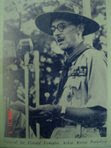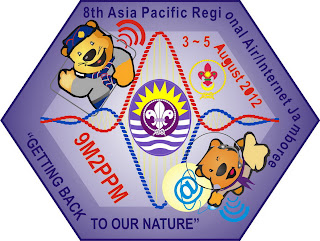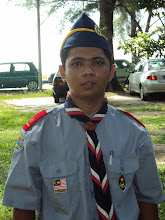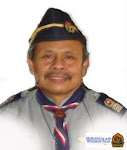22 Februari 1857 - 8 Januari 1941
Pada 22 Februari 1857,
Robert Stephenson Smyth Baden Powell
(BP) telah dilahirkan di London, England. Bapanya,
Reverend H.G. Baden Powell, seorang professor di Universiti Oxford. Ibunya, Henrietta Smyth adalah anak seorang Laksamana British bernama W.T. Smyth. BP mempunyai tujuh orang
adik-beradik. Pada tahun 1860 semasa BP berusia tiga tahun, bapanya
meninggal dunia.
Dalam tahun 1870 BP belajar di Sekolah
CharterHouse, London. BP
bukanlah mempunyai sebarang kelebihan melainkan beliau
periang dan berbakat dalam bidang sukan serta bidang seni.
Pada tahun 1876 semasa berusia 19 tahun, BP ditauliahkan sebagai Leftenan Muda dalam Pasukan Askar Hussar ke-13 dan ditempatkan di India. Dalam tahun 1883 BP telah dinaikkan
pangkat sebagai Kapten.
Dalam tahun 1887 BP berada di Afrika menyertai peperangan menentang keganasan orang-orang Zulu serta peperangan
dengan orang-orang Ashanti dan Matabele. Penduduk tempatan menggelarkan BP sebagai IMPEESA (haiwan yang tidak pernah tidur).
Pada tahun 1899 semasa beumur 42 tahun, BP dinaikkan pangkat sebagai Kolonel hasil dari kecekalan hati, kepintaran mengakap dan kebolehan luarbiasa dalam kerja mengesan.
DPM Dalam tahun 1899 juga telah berlakunya huruhara di Afrika Selatan. BP telah diperintah untuk menubuhkan 2 batalion
pasukan tentera berkuda dan pergi ke Mafeking, sebuah Bandar penting di tengah-tengah Afrika Selatan.
Peperangan meletus dari 13 Oktober 1899 hingga
18 Mei 1900 (217 hari) menyebabkan Mafeking diserang dan dikepung oleh jumlah musuh yang berlipat ganda. Selama kepungan berjalan, rakyat England berasa amat cemas.
Namun setelah berita Mafeking telah diselamatkan, BP menjadi pujaan seluruh rakyat England dan telah dinaikkan pangkat
menjadi Mejar Jeneral.
Pada tahun 1901,BP pulang
ke England dari Afrika Selatan sebagai hero yang dipuja dan dimuliakan oleh seluruh rakyat England, terutamanya
budak-budak. Beliau juga mendapati buku karangannya AIDS FOR SCOUTING turut diminati malah dijadikan subjek pelajaran di sekolah.
BP melihat peluang ini untuk berbakti kepada negaranya dengan lebih lanjut lagi lalu mengarang sebuah buku khas untuk budak-budak dengan mengumpulkan pengalaman-pengalaman beliau di India dan Afrika.
Bertitik tolak dari buku khas untuk budak-budak ini, semasa berusia 50 tahun, BP membawa sekumpulan budak lelaki seramai 20 orang ke Pulau Brownsea di Selat Inggeris pada mada musim panas tahun 1907 yang merupakan PERKHEMAHAN BUDAK-BUDAK PENGAKAP PERTAMA DI DUNIA!
Melalui kejayaan perkhemahan di Pulau Brownsea itu, pada awal tahun 1908, BP telah menerbitkan sebuah buku bernama Scouting For Boys. Diterbitkan setiap 2 minggu sebanyak 6 keluaran, ia mengandungi panduan melatih budak-budak menjadi Pengakap.
Buku Scouting For Boys telah dijadikan panduan untuk semua Pengakap dunia dan telah mengasaskan SUATU PERGERAKAN yang menyatukan budak-budak seluruh dunia kecuali negara-negara komunis.
Pada tahun 1910, pergerakan ini berkembang begitu pesat sehingga memaksa BP yang berjawatan sebagai Leftenan Jeneral ketika itu mengambil keputusan untuk berhenti dari pasukan tentera dan menumpukan sepenuh perhatian kepada Pengakap.
Peperangan Dunia Pertama tahun 1914 telah menyebabkan kegiatan Pengakap tergendala sementara. Namun pada tahun 1920 ahli ahli Pengakap dari seluruh dunia telah berkumpul di London dalam perkumpulan Pengakap antarabangsa yang pertama kali diadakan iaitu JAMBORI PENGKAP SEDUNIA PERTAMA!
Pada malam akhir Jambori tersebut iaitu pada 6 Ogos 1920, BP telah diisytiharkan sebagai PENGAKAP AGUNG DUNIA dan disambut dengan tepuk sorak gembira seluruh Pengakap yang hadir.
Pada tahun 1921, BP telah dianugerahkan darjah kebesaran oleh Kerajaan England dengan gelaran LORD BADEN POWELL of GILWELL tetapi bagi budak Pengakap seluruh dunia, beliap tetap BP yang agung.
Oleh yang demikian, adalah menjadi suatu kehilangan besar kepada semua orang khususnya ahli Pengakap apabila pada 8 Januari 1941 BP meninggal dunia. Mendiang dikebumikan dengan penuh kehormatan di bawah bayang-bayang kelembutan Gunung Kenya.





























































